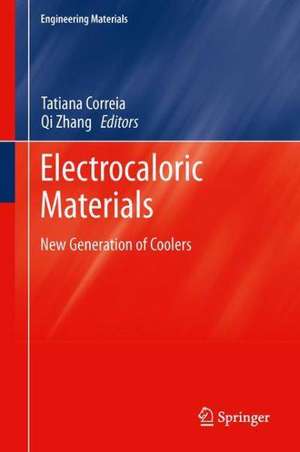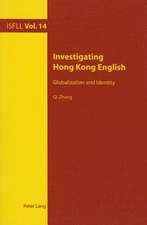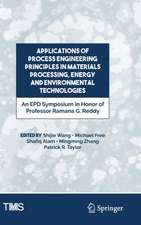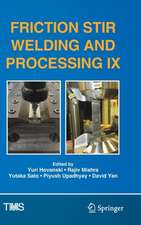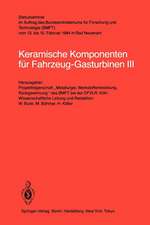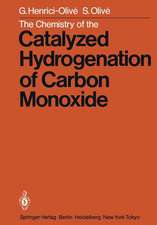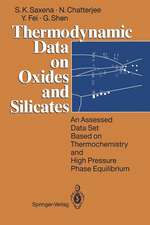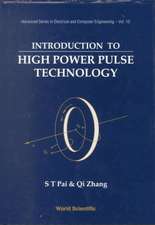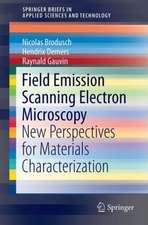Electrocaloric Materials: New Generation of Coolers: Engineering Materials, cartea 34
Editat de Tatiana Correia, Qi Zhangen Limba Engleză Hardback – 16 dec 2013
| Toate formatele și edițiile | Preț | Express |
|---|---|---|
| Paperback (1) | 638.76 lei 6-8 săpt. | |
| Springer Berlin, Heidelberg – 27 aug 2016 | 638.76 lei 6-8 săpt. | |
| Hardback (1) | 644.95 lei 6-8 săpt. | |
| Springer Berlin, Heidelberg – 16 dec 2013 | 644.95 lei 6-8 săpt. |
Din seria Engineering Materials
- 18%
 Preț: 1390.89 lei
Preț: 1390.89 lei - 18%
 Preț: 891.33 lei
Preț: 891.33 lei - 15%
 Preț: 703.85 lei
Preț: 703.85 lei - 18%
 Preț: 892.90 lei
Preț: 892.90 lei - 20%
 Preț: 573.70 lei
Preț: 573.70 lei - 24%
 Preț: 829.34 lei
Preț: 829.34 lei -
 Preț: 343.98 lei
Preț: 343.98 lei - 18%
 Preț: 1001.02 lei
Preț: 1001.02 lei - 18%
 Preț: 1396.43 lei
Preț: 1396.43 lei - 18%
 Preț: 946.55 lei
Preț: 946.55 lei - 18%
 Preț: 1120.99 lei
Preț: 1120.99 lei - 18%
 Preț: 1384.75 lei
Preț: 1384.75 lei - 18%
 Preț: 1236.99 lei
Preț: 1236.99 lei - 17%
 Preț: 490.22 lei
Preț: 490.22 lei - 15%
 Preț: 658.05 lei
Preț: 658.05 lei - 18%
 Preț: 1106.00 lei
Preț: 1106.00 lei - 18%
 Preț: 1101.26 lei
Preț: 1101.26 lei - 18%
 Preț: 1111.85 lei
Preț: 1111.85 lei - 18%
 Preț: 1002.61 lei
Preț: 1002.61 lei - 18%
 Preț: 889.75 lei
Preț: 889.75 lei - 18%
 Preț: 997.09 lei
Preț: 997.09 lei - 17%
 Preț: 428.09 lei
Preț: 428.09 lei - 15%
 Preț: 644.95 lei
Preț: 644.95 lei -
 Preț: 388.44 lei
Preț: 388.44 lei - 20%
 Preț: 566.85 lei
Preț: 566.85 lei - 18%
 Preț: 949.42 lei
Preț: 949.42 lei - 15%
 Preț: 631.72 lei
Preț: 631.72 lei - 15%
 Preț: 640.88 lei
Preț: 640.88 lei - 15%
 Preț: 635.47 lei
Preț: 635.47 lei - 18%
 Preț: 1233.20 lei
Preț: 1233.20 lei - 18%
 Preț: 1548.11 lei
Preț: 1548.11 lei - 18%
 Preț: 1126.03 lei
Preț: 1126.03 lei - 15%
 Preț: 638.11 lei
Preț: 638.11 lei - 15%
 Preț: 637.46 lei
Preț: 637.46 lei - 18%
 Preț: 1217.10 lei
Preț: 1217.10 lei - 18%
 Preț: 945.62 lei
Preț: 945.62 lei - 18%
 Preț: 948.61 lei
Preț: 948.61 lei - 18%
 Preț: 1224.54 lei
Preț: 1224.54 lei -
 Preț: 367.93 lei
Preț: 367.93 lei - 15%
 Preț: 639.25 lei
Preț: 639.25 lei - 15%
 Preț: 643.34 lei
Preț: 643.34 lei - 18%
 Preț: 955.08 lei
Preț: 955.08 lei - 15%
 Preț: 645.79 lei
Preț: 645.79 lei - 18%
 Preț: 1237.30 lei
Preț: 1237.30 lei - 18%
 Preț: 1114.34 lei
Preț: 1114.34 lei - 18%
 Preț: 1217.10 lei
Preț: 1217.10 lei - 15%
 Preț: 651.19 lei
Preț: 651.19 lei
Preț: 644.95 lei
Preț vechi: 758.77 lei
-15% Nou
Puncte Express: 967
Preț estimativ în valută:
123.44€ • 128.39$ • 103.45£
123.44€ • 128.39$ • 103.45£
Carte tipărită la comandă
Livrare economică 13-27 martie
Preluare comenzi: 021 569.72.76
Specificații
ISBN-13: 9783642402630
ISBN-10: 3642402631
Pagini: 200
Ilustrații: VIII, 253 p. 141 illus., 36 illus. in color.
Dimensiuni: 155 x 235 x 20 mm
Greutate: 0.54 kg
Ediția:2014
Editura: Springer Berlin, Heidelberg
Colecția Springer
Seria Engineering Materials
Locul publicării:Berlin, Heidelberg, Germany
ISBN-10: 3642402631
Pagini: 200
Ilustrații: VIII, 253 p. 141 illus., 36 illus. in color.
Dimensiuni: 155 x 235 x 20 mm
Greutate: 0.54 kg
Ediția:2014
Editura: Springer Berlin, Heidelberg
Colecția Springer
Seria Engineering Materials
Locul publicării:Berlin, Heidelberg, Germany
Public țintă
ResearchCuprins
Electrocaloric effect: An Introduction.- Constitutive Modeling of Electrothermal Properties in Polar Dielectric Materials and Thin Films.- Electrocaloric Effect in Relaxor Ferroelectric-based Materials.- Electrocaloric Effect in Multilayer Structures.- Electrocaloric Polymers.- Lead-free and exotic Electrocaloric Materials.- Indirect and Direct Measurements of the Electrocaloric Effect.- New Approaches to Electrocaloric-Based Multilayer Cooling.- Energy Harvesting from Temperature: use of Pyroelectric and Electrocaloric Properties.
Textul de pe ultima copertă
Since the 1997 Kyoto protocol of reduction of greenhouse gas emissions, the development of novel refrigerators has been a priority within the scientific community. Although magnetocaloric materials are promising candidates, they still need a large magnetic field to induce a giant ΔT as well as powerful and costly magnets. However, in electrocaloric materials (ECMs) a temperature change may be achieved by applying or removing an electric field. Since a giant electrocaloric effect on ferroelectric thin films was reported in Science in 2006, researchers have been inspired to explore such effect in different ferroelectric thin films. This book reviews electrocaloric effects observed in bulk materials as well as recent promising advances in thin films, with special emphasis on the ferroelectric, antiferroelectric and relaxor nature of ECMs. It reports a number of considerations about the future of ECMs as a means of achieving an efficient, ecologically sustainable and low cost refrigerator.
Caracteristici
First book on this subject Introduces a new generation of materials Written and edited by pioneers in the field
